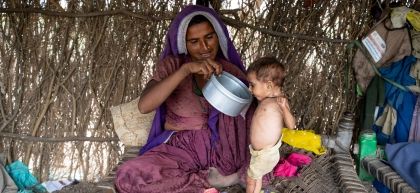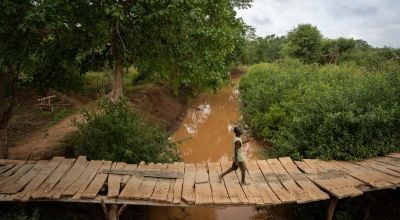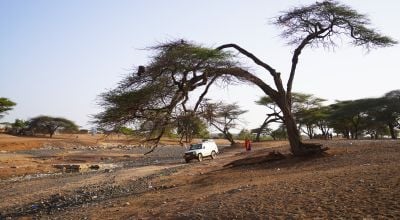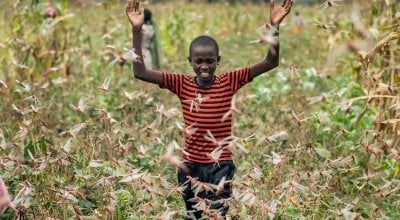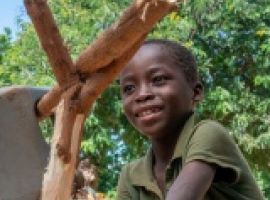
Read our 2022 annual report

Knowledge Hub
Humanitarian response in Ethiopia
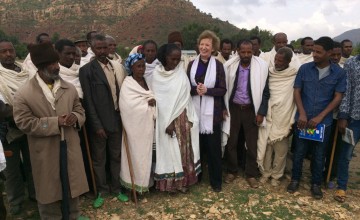
Ethiopian Airlines launched a direct flight from Dublin to Addis Ababa in 2014. This showed recognition of the importance of the relationship between our countries – a relationship that was formally established in 1994, the year Ireland opened an embassy in Ethiopia.
Strong relations over decades
Irish exports to Ethiopia are worth around €20 million, but the ties that bind our two countries run deeper: Ethiopia and Ireland have had strong relations over decades. Though geographically distant, a shared history of famine and poverty has linked our nations. Irish aid came before Irish trade, and the Irish people have consistently supported Ethiopia through the tough times. It was during a visit to Concern programmes in southern Ethiopia, that Bono was inspired to write U2’s classic song – “Where the Streets have no Name”.
The direct flight from Dublin to Addis takes about eight hours. From there, you can pick up a domestic flight to Mekelle, capital of the northern province of Tigray – a vast, mountainous, tough landscape. This was our destination last week and the focus of a visit with former President Mary Robinson and colleagues from Goal and Trócaire.
World’s first major climate crisis
We didn’t go because we like to travel together. We went to put a collective spotlight on what has been called the world’s first major climate crisis – the worst drought in 50 years – brought on by a lethal combination of El Niño and climate change. It has wiped out crops, devastated half the country, and left over ten million people in need of immediate assistance.
This crisis couldn’t have come at a worse time: a refugee crisis in Europe; slaughter in Paris, Nice, Brussels, and Turkey; shootings in Orlando; bombings in Baghdad; Donald Trump; Hilary Clinton; ISIS; and Brexit. This year has been a particularly chaotic one across the globe, filled with major stories that dominate the headlines. The slow creep of food shortage in Ethiopia has failed to command sufficient attention, but attention is what brings money. Money means solutions, and solutions means lives saved. So we invited former president and recently appointed UN Special Envoy on El Niño and Climate, Mary Robinson – a globally respected voice on climate and someone who commands star power – to help us draw attention to the crisis unfolding there.
Ethiopian government leading the response
Fortunately, Ethiopia is a nation transformed from that of 1984–85, when the country experienced starvation and famine on a horrendous, almost biblical scale. Its economy has grown at double digit rates for the last ten years, becoming a beacon of development in the region. Perhaps more importantly, resilience to cyclical climate shocks has improved dramatically and the government is leading on the current response to the effects of El Niño, having provided $800 million of government funds towards the relief efforts.
The scale of the current crisis however, is truly breath-taking. It is one that no nation could combat on its own. And although Ethiopia is unrecognisable from the country of thirty years ago, it is still a deeply impoverished country where more than 30 million people struggle to survive on less than $2 a day. Over 80 per cent of the population relies on agriculture for their livelihood, and while the country is remarkably self-sufficient – producing over 90 per cent of its food intake domestically – this also means that the nation can be particularly vulnerable to the effect of drought.
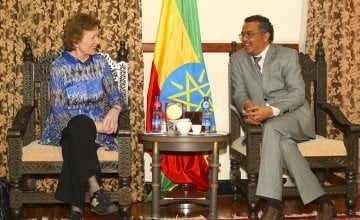
International support needed
El Niño generally occurs every seven years but this one has been amongst the strongest on record. Climate change has now compounded its effect and this has resulted in a prolonged drought across Ethiopia, one that has slowly decimated crops and livestock and robbed people of the livelihoods, their food and even their water supply.
Because the scale of disruption is so massive, it requires a herculean logistical response to avert a major catastrophe. Prevention and rapid response has been key and notably, the Ethiopian government have led on a robust nationwide response, ensuring that the devastation of the 1980s has not been repeated. However, the continued effects of El Niño and the potential effects of La Niña, including flash flooding, mean that an even greater internationally supported response is required to stave off humanitarian catastrophe and ensure that Ethiopia’s hard won development gains are not destroyed.
Massive funding gap
Over $1 billion of funding has already been secured but a further $500 million is needed to comprehensively meet the current challenge. That is what is necessary to reach the hardest hit, to get them through the crisis and provide them with seeds for early recovery.
One of the reasons we spotlighted Ethiopia was to show the funding gaps and what is required, but we were also there to showcase the incredible work that Irish aid agencies and Irish Aid-funded programmes have been doing in building up community resilience.
Nowhere was this more evident that in the region of Tigray – a region that has been particularly hard-hit by the drought – home to an estimated 200,000 of the over 700,000 refugees Ethiopia is currently hosting, many of whom come from Eritrea. It was here that we met Kahsay Gebretsadik, a man whose experience provided a telling insight into just how interconnected the world’s problems have now become.
After years of attempting to survive in Tigray, Kahsay had made the decision to migrate to Saudi Arabia for a better life. His journey was arduous, being smuggled by people traffickers across a series of borders, only to be detained in Saudi and deported back to Ethiopia after two weeks in jail. Now he is struggling again in this drought-ravaged environment but the Irish Aid humanitarian response is helping him get through it, helping him to resist the inevitability of fleeing again, and making another perilous journey of escape, this time perhaps across the Mediterranean.
We must confront these challenges
As climate change begins to bite harder than ever, it is the poorest of the poor who feel the effects of it most. But if the ongoing refugee crisis in Europe tells us one thing it is that we can no longer distance ourselves from the plight of those beyond our borders. If we don’t confront these challenges, we will be confronted by them. Right now, Ethiopia has been confronted with an overwhelming challenge. I have seen last week that the response is broad, agile and robust. Despite this drought of unprecedented magnitude, with the support of the international community, they can continue to rise to that challenge and hopefully avert humanitarian catastrophe, and in doing so, comprehensively show the world a nation positively transformed. 30 years after Live Aid, what a heartening thing that would be.
You can help
If you’d like to support our work in Ethiopia, you can donate at the link below.
